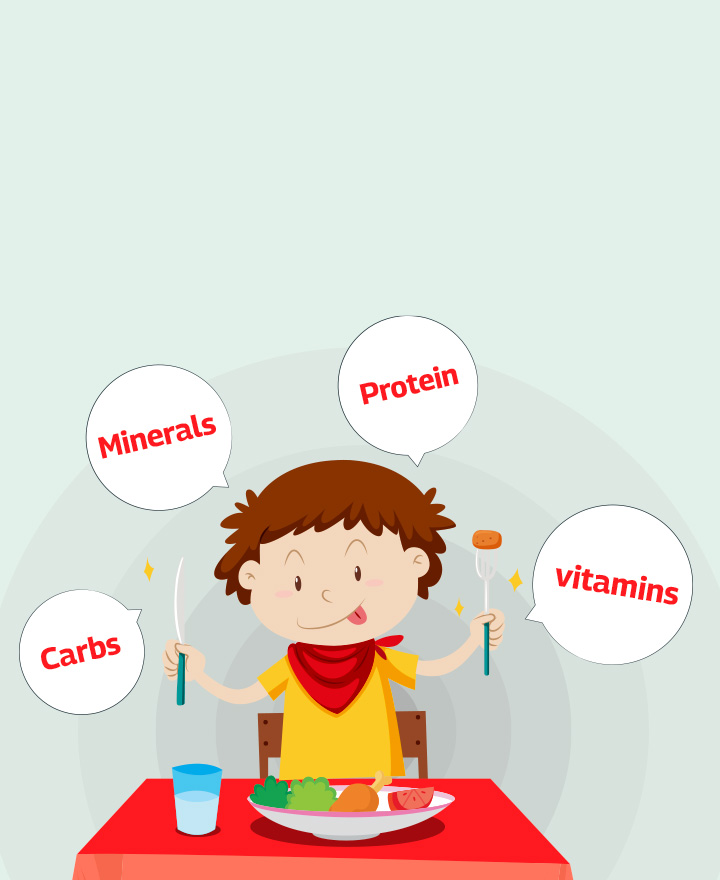

What are the Must-Have Nutrients in Your Kid’s Healthy Diet Plan
Every parent knows that children need to eat nutrient-rich, healthy, balanced meals. But do you know which nutrients are essential, and how much do your kids need the same?
A good balance of macronutrients (fats, proteins, carbs) and micronutrients (vitamins and minerals) is necessary for the healthy growth of your child’s body and brain. So, read on to know what essential nutrients you should include in a healthy diet plan for kids.
Why should you include vitamins?
Vitamins are important constituents of enzymes in your child’s body and perform various functions such as:
● Regulate nerve function
● Metabolise energy
● Make DNA and red blood cells
● Enhance immunity
● Keep skin and eyes healthy
● Promote digestion by helping absorb other nutrients
● Ensure cell and tissue repair
Here are the functions performed by specific vitamins in your kid’s body:
● Vitamin A –ensures good vision
● Vitamin B-complex –responsible for proper overall development
● Vitamin C –enhances immunity
● Vitamin D –makes strong bones and teeth
● Vitamin E –ensures healthy skin, good immunity, and prevents damage from free radicals
● Vitamin K - helps blood to clot and builds bones
Vitamins are found in fresh fruits and veggies, eggs, milk, fatty fish, and polyunsaturated plant oils like soybean and safflower. Ensure that the diet plan for kids includes fruits, veggies, dairy, and plant oils.
Why are minerals important?
Minerals are micronutrients, as they are required only in trace amounts. They are essential for your child’s healthy development as they perform a lot of vital functions in the body, like:
● Help utilise other nutrients and vitamins
● Promote growth
● Help in healing
● Essential for energy production
● Necessary components of enzymes and hormones
Here are examples of functions that specific minerals perform in your kid’s body:
● Iron helps carry oxygen in the blood
● Calcium is needed for strong bones
● Magnesium is important for energy, bone health, and to ensure good sleep
● Zinc is important for brain health and good memory. It also is vital for the production of thyroid hormone
● Potassium helps regulate blood pressure
Minerals like iodine, manganese, selenium, fluoride, sodium, copper etc. are also necessary for good health. Minerals can be found in fruits, nuts, seeds, vegetables, dairy, cereal, meat, and fish. So, your diet plan for kids should include these.
Why are proteins essential for your child?
Proteins are the building blocks of DNA and muscles. They are essential for the growth, repair and maintenance of your child’s body. Proteins are essential for:
● Transport and storage functions in the body
● Cell and tissue repair
● Formation of antibodies that fight off bacterial and viral infections
● Supply of energy
● Formation of enzymes and hormones
Why does your kid need carbs?
Carbohydrates are your child’s main source of energy. Carbs fuel the brain, muscles, kidneys, heart, and central nervous system. Kids need carbs to stay alert during the day.
Good sources of carbs include whole grains like brown rice, wheat, oats, beans, fruits, dairy, and starchy veggies like potatoes. Your diet plan for kids should include carbs from such sources. Avoid unhealthy carbs that contain simple sugars like candy, soft drinks, and processed foods.
What other nutrients does your child require?
Fat is another nutrient that is essential for your child’s development. Unsaturated fats like Omega-3 and Omega-6 fatty acids are essential for nerve cell and brain development during early childhood. Fats also perform other functions like:
● Keep the body warm
● Provide energy
● Help in the absorption of fat-soluble vitamins A, D, E and K
● Make up the structure of cell membranes, especially in the brain
● Reduce inflammation
Good sources of fats include nut butter, avocado, cheese, coconut, eggs, whole milk, dark meat, olive oil, walnuts, seeds, vegetable oils, yoghurt, wild salmon, dark meat, etc.
Conclusion
Now that you know which essential nutrients should be a part of your child’s diet, formulate a diet plan for your kids that is both tasty and nutritious. Also give them fibre-rich foods and plenty of water.If your child has food allergies or health concerns, do consult a paediatrician or a certified child nutritionist before making changes to your child’s diet
Disclaimer: This blog provides general information and discussions about health and related subjects. The information and other content provided in this blog, website or in any linked materials are not intended and should not be considered, or used as a substitute for, medical advice, diagnosis or treatment. Kindly contact your Doctor before starting a new medicine or health regime.
Related Articles
Wondering How To Get Your Kids To Eat Veggies? Here Are 10 Tricks
Planning To Go On A Diet? Here Are 5 Questions To Ask First
Boost Your Kid’s Immunity With These 10 Super Foods
Published on December 17, 2021














 Health Insurance
Health Insurance  Travel Insurance
Travel Insurance  Car Insurance
Car Insurance  Cyber Insurance
Cyber Insurance  Critical Illness Insurance
Critical Illness Insurance
 Pet Insurance
Pet Insurance
 Bike/Two Wheeler Insurance
Bike/Two Wheeler Insurance  Home Insurance
Home Insurance  Third Party Vehicle Ins.
Third Party Vehicle Ins.  Tractor Insurance
Tractor Insurance  Goods Carrying Vehicle Ins.
Goods Carrying Vehicle Ins.  Passenger Carrying Vehicle Ins.
Passenger Carrying Vehicle Ins.  Compulsory Personal Accident Insurance
Compulsory Personal Accident Insurance  Travel Insurance
Travel Insurance  Rural
Rural